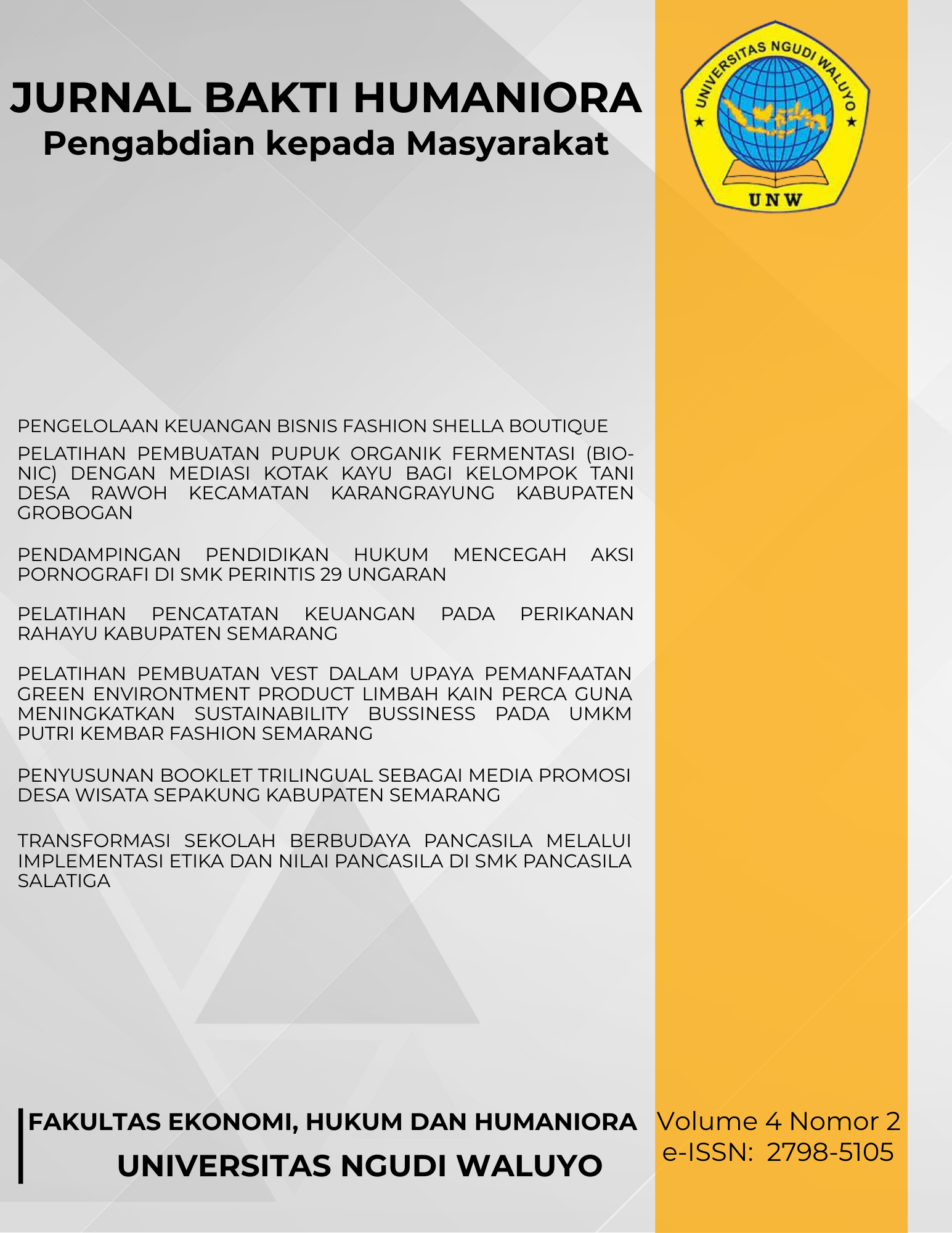PELATIHAN PEMBUATAN VEST DALAM UPAYA PEMANFAATAN GREEN ENVIRONTMENT PRODUCT LIMBAH KAIN PERCA GUNA MENINGKATKAN SUSTAINABILITY BUSSINESS PADA UMKM PUTRI KEMBAR FASHION SEMARANG
DOI:
https://doi.org/10.35473/jbh.v4i2.3554Abstract
UMKM Putri Kembar Fashion Semarang faces challenges in managing waste fabric scraps produced from the production process. This waste is often considered worthless and has the potential to pollute the environment. This Community Service PKM) aims to provide solutions through training in making vests by utilizing waste fabric scraps, thereby supporting the use of green environmental products and increasing business sustainability. The methods used include education and practice-based training, starting from scrap fabric sorting techniques, vest design, to effective production processes. This training also includes aspects of creative marketing and sustainable product development strategies, so that the end result can provide added value to waste fabric scraps. The main target of the program is to improve the skills of human resources in this UMKM, while creating environmentally friendly products with economic value. The expected output of this program is the creation of product innovations in the form of vests made from waste fabric scraps that have market competitiveness. In addition, this program also aims to increase the understanding of UMKM actors regarding the importance of implementing sustainability principles in business. Through this training, it is expected that UMKM Putri Kembar Fashion will be able to reduce production waste, increase income, and expand marketing networks. Overall, this program is expected to be a model for empowering UMKM based on green product innovation that supports environmental preservation while increasing business sustainability. With the success of this program, UMKM is expected to be able to become an example of sustainable business practices in the city of Semarang.
Abstrak
UMKM Putri Kembar Fashion Semarang menghadapi tantangan dalam pengelolaan limbah kain perca yang dihasilkan dari proses produksi. Limbah tersebut sering kali dianggap tidak bernilai dan berpotensi mencemari lingkungan. Pengabdian Kepada Masyarakat (PKM) ini bertujuan untuk memberikan solusi melalui pelatihan pembuatan vest dengan memanfaatkan limbah kain perca, sehingga mendukung pemanfaatan green environment product dan meningkatkan keberlanjutan bisnis (sustainability business). Metode yang digunakan meliputi edukasi dan pelatihan berbasis praktik, mulai dari teknik pemilahan kain perca, desain vest, hingga proses produksi yang efektif. Pelatihan ini juga mencakup aspek pemasaran kreatif dan strategi pengembangan produk berkelanjutan, sehingga hasil akhirnya dapat memberikan nilai tambah pada limbah kain perca. Target utama program adalah meningkatkan keterampilan sumber daya manusia di UMKM ini, sekaligus menciptakan produk bernilai ekonomi yang ramah lingkungan.Luaran yang diharapkan dari program ini adalah terciptanya inovasi produk berupa vest berbahan limbah kain perca yang memiliki daya saing pasar. Selain itu, program ini juga bertujuan untuk meningkatkan pemahaman pelaku UMKM terkait pentingnya penerapan prinsip keberlanjutan dalam bisnis. Melalui pelatihan ini, diharapkan UMKM Putri Kembar Fashion mampu mengurangi limbah produksi, meningkatkan pendapatan, dan memperluas jaringan pemasaran.Secara keseluruhan, program ini diharapkan dapat menjadi model pemberdayaan UMKM berbasis green product innovation yang mendukung pelestarian lingkungan sekaligus meningkatkan keberlanjutan bisnis. Dengan keberhasilan program ini, UMKM diharapkan mampu menjadi contoh praktik bisnis berkelanjutan di Kota Semarang.
References
Abdullahi, M. S., Raman, K., & Solarin, S. A. (2021). Effect of organizational culture on employee performance: A mediating role of employee engagement in malaysia educational sector. International Journal of Supply and Operations Management, 8(3), 232–246. https://doi.org/10.22034/IJSOM.2021.3.1
Ahmar, N., Rahmah, L. Al, & Darminto, D. P. (2024). Green banking disclosure from the perspective of corporate governance, financial slack and human resource slack in Indonesia. Banks and Bank Systems, 19(2), 101–114. https://doi.org/10.21511/bbs.19(2).2024.08
AlNuaimi, B. K., Singh, S. K., & Harney, B. (2021). Unpacking the role of innovation capability: Exploring the impact of leadership style on green procurement via a natural resource-based perspective. Journal of Business Research, 134(May), 78–88. https://doi.org/10.1016/j.jbusres.2021.05.026
Alshura. (2017). Impact of green brand trust, green brand awareness, green brand image, and green perceived value on consumer’s intension to use green products: an empirical study of jordanian consumers. International Journal of Advanced Research, 19, 1423–1433.
Hanaysha, J. R. (2017). Impact of Social Media Marketing, Price Promotion, and Corporate Social Responsibility on Customer Satisfaction. Jindal Journal of Business Research, 6(2), 132–145. https://doi.org/10.1177/2278682117715359
Julia, T., & Kassim, S. (2020). Exploring green banking performance of Islamic banks vs conventional banks in Bangladesh based on Maqasid Shariah framework. Journal of Islamic Marketing, 11(3), 729–744. https://doi.org/10.1108/JIMA-10-2017-0105
Nart, S., Bilgili, A., & Orgut, E. D. (2024). The Effect of Green Human Resources Management Practices on Corporate Sustainability from the Perspective of Employees. Economics, 18(1). https://doi.org/10.1515/econ-2022-0060
Nurcahyo, S., Widagdo, T., Sudiyono, S., & Ali, A. (2023). Strategic Study: Optimization of Strengthening Critical Thinking and Teamwork of the Marketing Division of PT Suzuki Mobil Sejahtera Trada Pemuda Semarang. https://doi.org/10.4108/eai.28-10-2023.2341813
Orlova, E. V. (2021). Design of personal trajectories for employees’ professional development in the knowledge society under industry 5.0. Social Sciences, 10(11). https://doi.org/10.3390/socsci10110427
Puspasari, A. (2012). Faktor-Faktor Yang Mempengaruhi Alih Fungsi Lahan Pertanian dan Dampaknya Terhadap Pendapatan Petani (Studi Kasus Desa Kondang Jaya, Kecamatan Karawang Timur, Kabupaten Karawang). Bogor: Departemen Ekonomi Sumberdaya Dan Lingkungan Fakultas Ekonomi Dan Manajemen IPB, 05.
Rath. (2015). An Impact og Green Marketing on Practices of Supply Chain Management in Asia: Emerging Economic Opportunities and Challenges. International Journal of Supply Chain Management, 02, 11–19.
Sajeda Alma’abreh, Siti Nur ‘Atikah Zulkiffli, & Nik Hazimah Nik Mat. (2023). Leveraging Green Human Resource Management and Organizational Culture in Performance. Journal of Namibian Studies : History Politics Culture, 33, 121–134. https://doi.org/10.59670/jns.v33i.418
Zulkarnain, R., Taufik, H., & Ramdansyah, A. D. (2020). Pengaruh Kualitas Pelayanan dan Kualitas Produk terhadap Loyalitas Nasabah dengan Kepuasan Nasabah sebagai Variabel Intervening (Studi Kasus Pada PT Bank Syariah Mu’amalah Cilegon). Jurnal Manajemen Dan Bisnis, 1–24.
Downloads
Published
Issue
Section
License

This work is licensed under a Creative Commons Attribution-NonCommercial-ShareAlike 4.0 International License.
Copyright notice:
- Authors retain copyright and grant the journal right of first publication with the work simultaneously licensed under a Creative Commons Attribution License that allows others to share the work with an acknowledgement of the work's authorship and initial publication in this journal.
- Authors are able to enter into separate, additional contractual arrangements for the non-exclusive distribution of the journal's published version of the work (e.g., post it to an institutional repository or publish it in a book), with an acknowledgement of its initial publication in this journal.
- Authors are permitted and encouraged to post their work online (e.g., in institutional repositories or on their website) prior to and during the submission process, as it can lead to productive exchanges, as well as earlier and greater citation of published work (See The Effect of Open Access)



